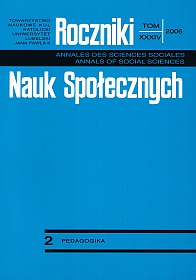The Parents' Educational Action in the Sphere of Forming the Identity of Young People
Abstract
The article tackles the issue connected with the parents' educational action in the sphere of forming the identity of young people. Identity understood most generally as identity in pedagogy and psychology is analyzed in two aspects: those of personal and social identity. In the description of identity as qualitative developmental change in the life cycle one should especially stop at the stage of adolescence. It is a time of dynamic change, of asking essential questions, and in Erikson's opinion, it is a time of conflict on the level: identity – dispersal of identity. Identity's developmental dynamism at the stage of adolescence is the resultant of different factors; the process of education in the family takes a significant place among them.
Since formation of a young man's identity happens in the context of the whole of psychophysical development, the family's educational function should be carried out in agreement with the conception of man's integral education. The parents' educational action, supporting development of identity in young people should first of all aim at broadening the adolescents' self-knowledge, forming a clearly defined hierarchy of values, broadening the personal models, helping to verbalize their plans, aims and aspirations. Development of identity in adolescents can be hampered by educational errors. Attention mainly should be paid to the parents' overprotective attitudes, an autocratic style of education, the symbiotic bond between the parent and the child, disturbance of the inter-family borders or transmission of irrationality.
The course of the educational process in the family in the area of identity formation in adolescents happens on the basis of identification and giving meanings (internalization). This is why it is so important who the parents are, what their sense of identity is, which identity they experience as the leading one. The parents' self-knowledge and self-definition as well as the quality of interfamily interactions is the beginning of formation of identity in their children and it is in this structure of The personal I and the social We that the parents' educational function is inscribed.
References
Brzezińska A., Trempała J. (2003). Wprowadzenie do psychologii rozwoju. W: J. Strelau (red.). Psychologia. Podręcznik akademicki. T. 1. Gdańsk: GWP s. 229-285.
Cierpka A. (2002). Tożsamość jednostki wśród rodzinnych narracji. W: J.Trzebiński (red.). Narracja jako sposób rozumienia świata. Gdańsk: GWP s.173-189.
Domachowski W. (1993). Społeczne i kulturowe uwarunkowania patologii. W: H. Sęk (red.). Społeczna psychologia kliniczna. Warszawa: Wydawnictwo Naukowe PWN s.162-187.
Grzelak M., Jarymowicz M. (2003). Tożsamość i współzależność. W: J. Strelau (red.). Psychologia. Podręcznik akademicki. T. 3. Gdańsk: GWP s. 107-144.
Hall C. S., Lindzey G. (2002). Teorie osobowości. Warszawa: Wydawnictwo Naukowe PWN.
Kuczyńska A. (1992). Inwentarz do oceny płci psychologicznej. Podręcznik. Warszawa: Pracownia Testów Psychologicznych PTP.
Markus H. (1993). Ja w myśli i pamięci. W: T. Maruszewski (red.). Poznanie, afekt, zachowanie. Warszawa: Wydawnictwo Naukowe PWN s. 102-130.
Melosik Z. (1996). Tożsamość, ciało i władza. Teksty kulturowe jako (kon)teksty pedagogiczne. Poznań–Toruń.
Melosik Z. (2001). Kultura instant – paradoksy pop-tożsamości. W: A. Nalaskowski, K. Rubacha (red.). Pedagogika u progu trzeciego tysiąclecia. Toruń: Wydawnictwo UMK.
Miluska J. (1996). Tożsamość kobiet i mężczyzn w cyklu życia. Poznań: Wydawnictwo Naukowe UAM.
Nikitorowicz J. (2001). Kultury lokalne i regionalne (małe ojczyzny) wkonflikcie z kulturą globalną. W: E. Trempała, M. Cichosz (red.). Pedagogika społeczna. Tradycja – teraźniejszość – nowe wyzwania. Olecko: Wszechnica Mazurska s. 152-166.
Nowak M. (1998). Funkcja wychowawcza matki i ojca według pedagogii personalistyczno-chrześcijańskiej. „Roczniki Nauk Społecznych” T. XXVI (2) s. 107-139.
Obuchowska I. (2001). Adolescencja. W: B. Harwas-Napierała, J. Trempała (red.). Psychologia rozwoju człowieka. Charakterystyka okresów życia człowieka. T. 2. Warszawa: Wydawnictwo Naukowe PWN s. 163-202.
Oleś P. (2002). Rozwój osobowości. W: B. Harwas-Napierała, J. Trempała (red.). Psychologia rozwoju człowieka. Rozwój funkcji psychicznych. T. 3. Warszawa: Wydawnictwo Naukowe PWN s. 131-178.
Opozda D. (2001). Integracja rodziny a wiedza o małżeństwie u młodzieży. Lublin: RW KUL.
Opozda D. (2003a). Świadomość wychowawcza rodziców. W: R. Piwowarski (red.). Dziecko – nauczyciel – rodzice. Konteksty edukacyjne. Białystok–Warszawa: Wydawnictwo Uniwersytetu w Białymstoku, s. 155-163.
Opozda D. (2003b). Patologia w relacjach rodzinnych przedmiotem diagnozy pedagogicznej. „Roczniki Pedagogiki Rodziny” T. VI s. 75-83.
Przetacznik-Gierowska M., Włodarski Z. (1994). Psychologia wychowawcza. T.2. Warszawa: Wyd. Naukowe PWN.
Rynio A. (2004). Integralne wychowanie w myśli Jana Pawła II. Lublin: Wydawnictwo KUL.
Strojnowski J. (1985). Psychoterapia. Warszawa: Instytut Wydawniczy PAX.
Szkudlarek T. (2003). Pedagogika krytyczna. W: Z. Kwieciński, B. Śliwerski (red.). Pedagogika. Podręcznik akademicki. Warszawa: Wydawnictwo Naukowe PWN.
Waloszek D. (2001). Rodzinny kontekst tożsamości dzieci pogranicza zachodniego – matka. W: H. Cudak, H. Marzec (red.). Współczesna rodzina polska – jej wymiar aksjologiczny i funkcjonowanie. Piotrków Trybunalski: Naukowe Wydawnictwo Piotrkowskie.
Wojciszke B. (1986). Teoria schematów społecznych. Struktura i funkcjonowanie jednostkowej wiedzy o otoczeniu społecznym. Wrocław: Wyd. PAN.
Copyright (c) 2006 Roczniki Nauk Społecznych

This work is licensed under a Creative Commons Attribution-NonCommercial-NoDerivatives 4.0 International License.


